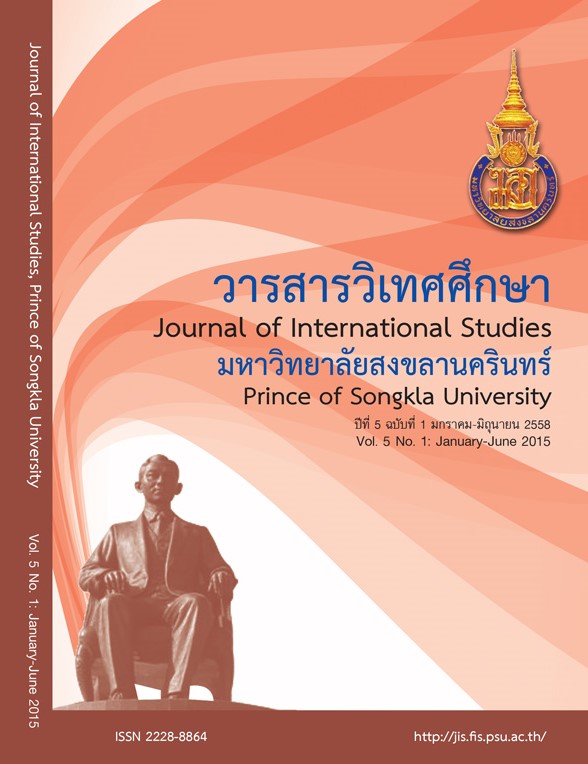Transnational Marriage between German Men and Thai Women: Socio-cultural Adaptation
Main Article Content
Abstract
This study as the representation of changing to life of Thai women in Germany includes adapting and learning to continue their life in German society and culture. Therefore to present the phenomena about life of Thai Ethnic group abroad in the dimension of minority group status objectives are to study issues of Ethnography about changing in life of Thai immigrant women in Germany through transnational marriage and the problems of life and adaptation as the minority status in social and cultural context that is different from Thai social and cultural.
The results show that transnational marriages of Thai women and German men could comprehend by the analysis links to world economic system and the status of being marginal people in Thai society. In a new society Thai women become a minority group thus they have to adapt to the new society and culture. Therefore cultural learning is as the strategy of adaptation to live a majority group.
Article Details
Statements and opinions expressed in articles herein are those of the authors and do not necessarily reflect the position of the editors or publisher.
Article, information, text, image, etc. which are published in Journal of International Studies, belong to Journal of International Studies. If anybody or any organization would like to use part or whole of them, they must receive written permission from Journal of International Studies before usage.
References
คนไทยแยกตามรัฐ. ค้นเมื่อ 20 ธันวาคม 2556.จาก
http://www.thaigeneralkonsulat.de/th/main/history.html
สถานกงสุลใหญ่ ณ นครแฟรงก์เฟิร์ต. (2551). ตารางแสดงจำนวน
คนไทยในประเทศเยอรมนีระหว่าง ปี พ.ศ. 2545-2551. ค้นเมื่อ 20 ธันวาคม 2556. จาก
http://www.thaigeneralkonsulat.de/th/main/history.html
สุมิตร สุวรรณ. (2554). รัฐกับแนวคิดและทฤษฎีการพัฒนา.
ภาควิชาการพัฒนาทรัพยากรมนุษย์และชุมชน คณะศึกษาศาสตร์และ
พัฒนศาสตร์มหาวิทยาลัยเกษตรศาสตร์ วิทยาเขตกำแพงแสน.
ศิริพร สะโครบาเนค และคณะ. (2540). การค้าหญิง : วิถีสังคมไทย.
กรุงเทพฯ: มูลนิธิผู้หญิง.
Appardurai, Arjun. (2003). “Sovereignty without Territoriality:
Notes for a Postnational Geography”.In The Anthropology
of Place and Space: Locating Culture. Oxford: Blackwell.
Cardoso, Fernando Henrique. (1979). Dependency and
Development in Latin America. Berkeley:University of
California Press.
Cohen, Erik. (1986). Lovelorn Farangs : The Correspondence
between Foreign Men and Thai Girls.Anthropological
Quarterly, 59 (3), 115-127.
Kofman, Eleonore. (2013). The Economic and Social Aspects of
Migration. Women Migrants and Refugees in European
Union, 21-22 January 2003 Brussels. European Commission
and The OECD.
Franz, Barbara. (2003). Bosnian Refugee Women in (Re)
Settlement: Gender Relations and SocialMobility. Feminist
Review, (73), 86-103.
Goossen, Jean. (1976). The Migration of French West Indian
Women to Metropolitan France. Anthropological Quarterly,
49 (1), 45-52.
International Dialogue on Migration. (2010). Migration and
Transnationalism: Opportunities andChallenges,
9-10 March2010.
Karen o’Reilly. (2012). International Migration and Social Theory.
New York: Palgrave Macmillan.
Lapanun, Patcharin. (2010). Becoming a Bride: Negotiating
Material Desire,Sexuality, and One’s Fate. ANRC Workshop
“ Human Security and Religious Certainty in Southeast
Asia”, 15-17 January Chiang Mai Thailand.
Maslow, Abraham. (1954). Motivation and personality.
New York, NY: Harper.
Morokvasic, Mirjana. (1991). Settled in Mobility : Engendering
Post-Wall Migration in Europe.Feminist Review, (77), 7-25.
Robinson, Kathryn. (1996). Of Mail-Order Brides and Boys Own
Tales: Representations of Asian- Australian Marriages.
Feminist Review,( 52), 53-68.


